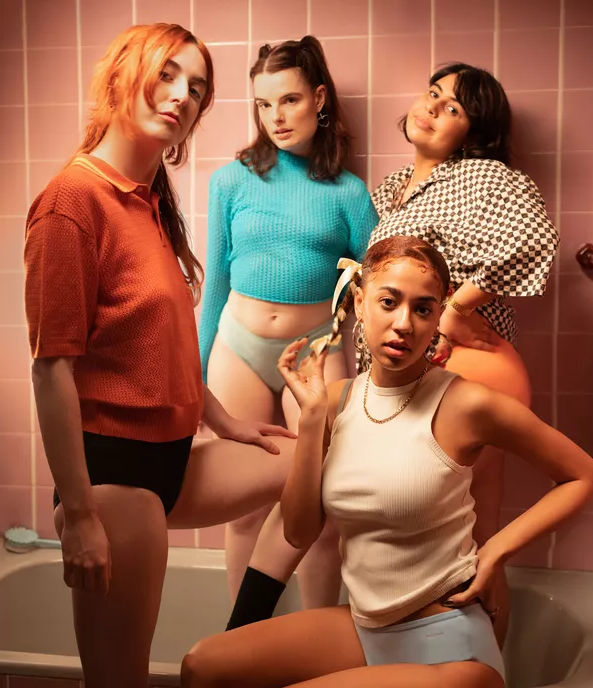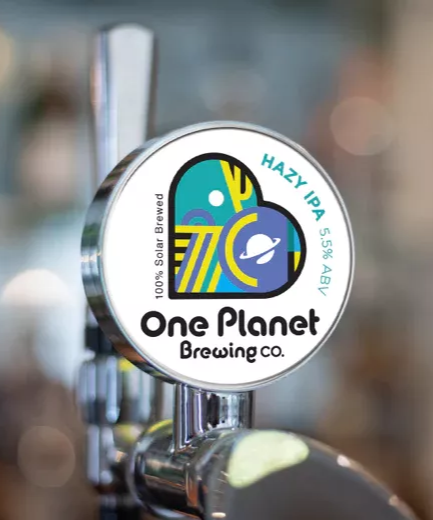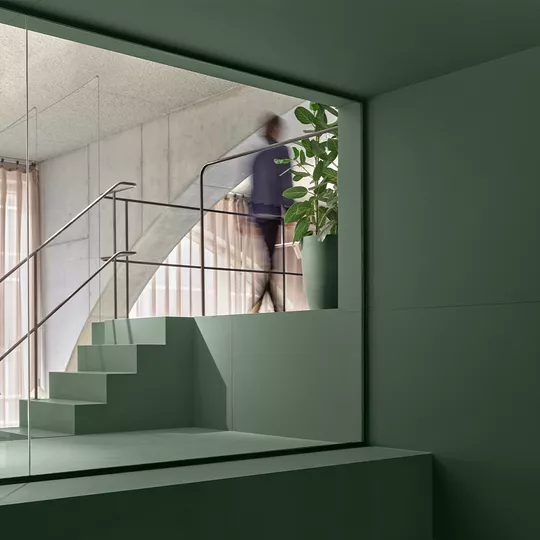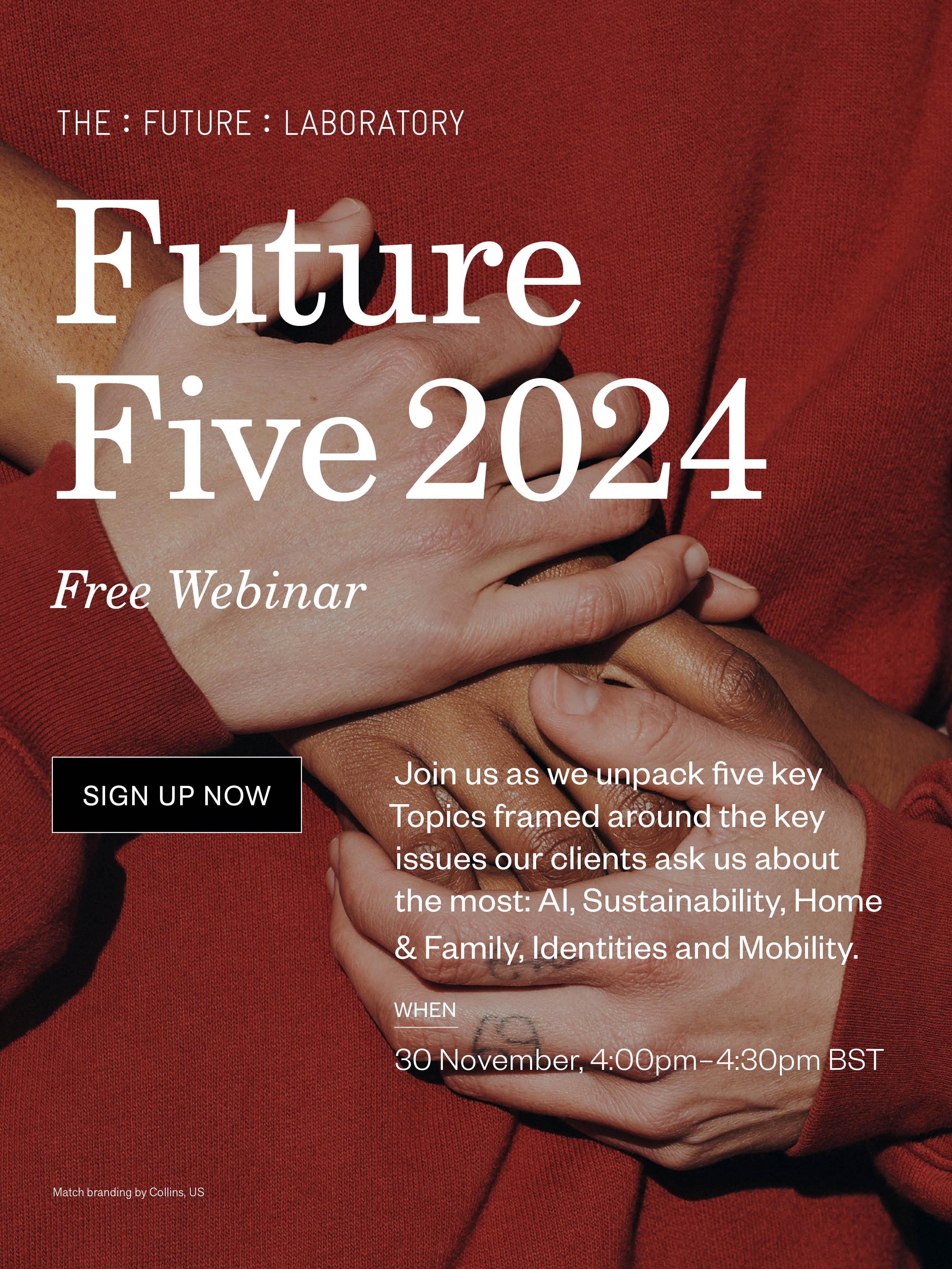20 : 10 : 23 : Weekly Debrief
This week: Residential Retail, Gamers want healthier snacks, A tampon tax back coalition, eco-friendly beer, the new meaning of home, MVRDV converts mixed-use tower into women and children centre, and Future Five.
20 October 2023
Author: The Future Laboratory
Image: Home Memories by Balbek Bureau. Photography by Slava Balbek, Antarctica
Share
𝕏
1. Home States Futures: Residential Retail
In order to step into one’s home, brands (just like vampires) must first be invited in. Knocking on the front door means choosing one of the various doors that Alexa, Google and even connected fridges have opened for brands. In a post-Covid new normal, where houses must function as both a living space and a workplace thanks to the acceptance of – and employee demand for – hybrid working, there’s definitely no place like home for brands. Its rising status as a multi-faceted hub is driving new business opportunities in unexpected ways, from the aforementioned technology making our homes smarter to health and wellbeing practices leaving hospitals and surgeries in favour of our homes.
‘Once snootily dismissed by former British prime minister Margaret Thatcher as ‘where you come to when you’ve got nothing better to do’, the home has now become the first-choice destination in an oversaturated market offering better things to do elsewhere,’ says Martin Raymond, co-founder of The Future Laboratory and editor-in-chief of LS:N Global.
Even the entertainment industry is shining a more intense light on homes, as they become entrenched as extensions of one’s identity. Take the success of real estate reality show Selling Sunset or Architectural Digest’s Open Door series on YouTube; consumers want to snoop into someone’s home, be inspired by what they see and know more about how the owners are defining themselves through the spaces they inhabit.
Ironically, though, acquiring a home is tougher than ever. In the UK, amid a cost of living crisis spurred on by rising inflation and a home ownership market proving particularly hostile to Millennials, born between 1980 and 1995, the concept of home itself is being driven to evolve further. New kinds of multi-generational or chosen families living under one roof will proliferate. One in three of Britain’s Millennial generation will never even own their own home, with many forced to live and raise families in insecure, privately rented accommodation throughout their lives (source: Resolution Foundation).
 Modibodi, Australia
Modibodi, Australia
2. US brands create Tampon Tax Back Coalition
US – In a collective push for menstrual equity, eight women-founded menstrual hygiene brands have formed the Tampon Tax Coalition to advocate for the elimination of taxes on menstrual products in the 21 states where they are still levied. Despite progress in recent years, with 22 states eliminating these taxes over the past decade, the coalition aims to ensure that the taxation of menstrual products becomes a thing of the past across the US.
The coalition believes this is only the beginning of a broader effort to make menstrual products more affordable and accessible – in a fight against period poverty. As part of their advocacy, the coalition is committed to reimbursing customers who have paid taxes on these products in states where they are still levied. Consumers can visit the coalition’s website within 10 days of purchase, submit their receipt, and expect a Venmo reimbursement within 24 hours.
The Tampon Tax Back Coalition comprises eight brands: Saalt, August, Cora, Diva, Here We Flo, The Honey Pot, Lola and Rael. Despite their competitive landscape, these brands have come together in a united front to drive positive change.
As explored in Civic Brands, brands should be ready to become educators, enablers and activists to make the change they want to see in the world.
3. Stat: Over half of US gamers are seeking healthy snack options
US – A September 2023 study by American eSports organisation NRG portrays gamers as serial snackers who enjoy healthy snack options. After surveying 1,551 gamers based in the US, NRG revealed how video game players are avid snackers who eat snacks five times or more per day. Some 54% of gamers surveyed snack while playing video games, and 85% do so to change or improve their mood.
The most popular snacks among gamers are chips (crisps) and crackers, followed by indulgent delicacies such as cookies, chocolate, frozen treats and candy. Fruit is their sixth most favourite snack. Although traditional snacks are preferred, 56% of gamers will still eat healthy snacks. NRG also found that over 20% of video game players are more likely to buy snacks from a convenience store than the general population – hinting at opportunities for local shops and convenient commerce.
As explored in our Gastro Gaming Market report, food and drink brands have explored opportunities presented by gamers’ tastes and are now turning to gaming to offer tastes, skins and experiences that transcend the screen.
4. Solar-powered brewery brings eco-friendly beer to Britain
UK – A new British brewery based in Surrey, England, is using solar energy to make eco-friendly beer. One Planet Brewing uses photovoltaic solar panels to generate enough electricity to power its 15-hectolitre, electric brewery.
The brewery’s first beer is a 5.5% abv Hazy IPA which is available to purchase in keg and can form from October 2023. One Planet Brewery also sources home-grown and local hops, uses re-usable kegs and glass flagons, and only offers delivery to customers within a 30-mile radius.
The company’s brewing capacity will also be limited by the amount of solar energy it can generate. In the sunny summer months, One Planet Brewery will sell its excess to the grid and buy back what it needs over the winter months. Initially, this means just four or five brews per month, with production paused from December to February.
As explored in our Solar Sustenance microtrend report, solar power is fast emerging as a long-term, affordable and sustainable option for food and drink businesses looking to reduce costs, promote sustainability and enhance their eco-friendly reputations.
 One Planet Brewing, UK
One Planet Brewing, UK
 Wet Beast Office. Design by Studioninedots. Photography by Maarten Willemstein, The Netherlands
Wet Beast Office. Design by Studioninedots. Photography by Maarten Willemstein, The Netherlands
5. Viewpoints : The New Meaning of Home
Should businesses care about semiotics (the study of signs, symbols and their meaning)? Sign Salad’s founder, Dr Alex Gordon, believes that studying sign processes and meaning-making can drive growth, purpose and revenue streams. As LS:N Global analyses the potential for the home to become a new kind of retail space for brands in its macrotrend report, Home States Futures: Residential Retail, Gordon believes that questioning how language, symbols and signals can say more about how to navigate this metamorphosis of home as a concept, a place and a feeling.
To understand and speculate on the future meaning of home, it’s essential to return to the home’s primary function as a place of shelter. Maslow’s hierarchy, which offers a typology of human needs, defines shelter as one of the physiological needs sitting in the same category as air, water, food, sleep, clothing and reproduction.
‘The home is now a split between burden, anxiety, tension, pressure, a place of escape, pleasure, leisure, family retreat and personal creative exploration,’ says Gordon.
Read more on LS:N Global.
6. MVRDV converts mixed-use tower into women and children centre
China – Dutch architectural firm MVRDV has transformed a tower block in Shenzhen, China, into a colourful women and children’s centre.
Behind a multi-coloured gridded façade, the Shenzhen Women & Children’s Centre houses facilities such as a library, auditorium, children’s theatre, discovery hall, therapy rooms and offices for staff, as well as commercial offices, hotel and retail spaces.
Aiming to promote adaptive re-use, MVRDV re-used some 24,000 cubic metres of concrete from the original structure, making a carbon-saving equivalent of 11,800 flights from Amsterdam to Shenzhen.
‘Showing that even the most inadequate of these structures can be re-used could save a crazy amount of concrete going to landfill – and eliminate millions of tonnes of carbon emissions that would have been created replacing that concrete,’ founding partner of MVRDV, Jacob van Rijs, told World Architecture.
Keep up to date with the latest sustainable innovations in design, architecture and mobility in our Sustainability topic on LS:N Global.
Looking for new ways to monetise their followings and replicate their viral travel experiences for their followers, entrepreneurial travel content-creators are filling the gap and hosting paradisiac trips tailored towards groups under-represented in the traditional travel industry.
These innovative new-era ‘travel agents’ blur the line between tour operator and travel influencer, sleeping, eating, hiking and partying side by side with their followers. Fuelled by algorithms, this growing wave of social-first travel collectives are fulfilling Gen Z’s desire for adventure, community and authenticity.
7. Free Webinar: Future Five 2024-2025
Join us for this free webinar, giving you a concise overview of LS:N Global’s latest trends update. Future Five 2024 is designed to help you jump straight to the key insights, opinions and future opportunities that you need to know about right now.
The report is built around the Topics section on LSNGlobal.com, which features industry-leading insight, foresight, trend forecasting and strategic analysis of the most important themes of tomorrow, relevant for today. These are: AI, Sustainability, Home & Family, Identities and Mobility.
In this free webinar, including a Q&A with our experts, we’ll discuss five of our leading Topics, based on the issues that brands, companies and collaborators ask us about the most, or in some instances, the things that we think they should be asking about.
The session will take place on 30 November from 2:00pm to 2:30pm BST.
Register to attend our free 30-minute live-stream for a concise introduction to our Future Five research for 2024.
We will also launch an accompanying Future Five 2024 report, which will be available to purchase on the day.

Want to read more?
Become a member today!
Sign up to one of our trends intelligence platform, LS:N Global and get unlimited access to a hive of insights - from microtrends and macro trends to market reports, daily news, research across eight industry sectors and much more.
Discover our memberships
Already a member? Click here to login
